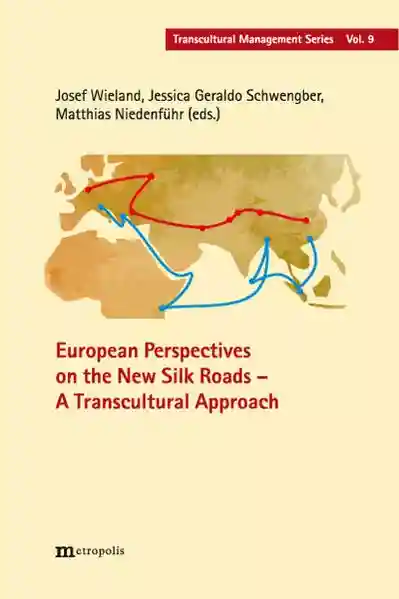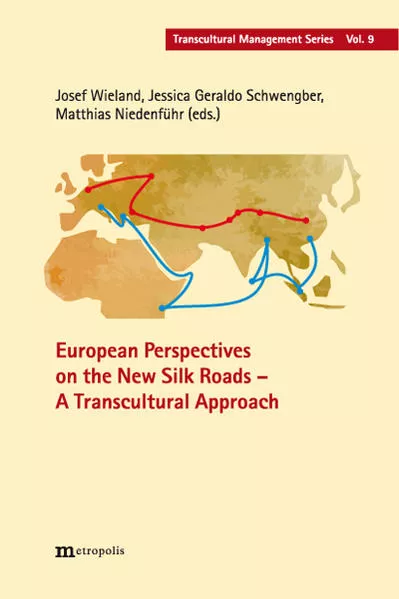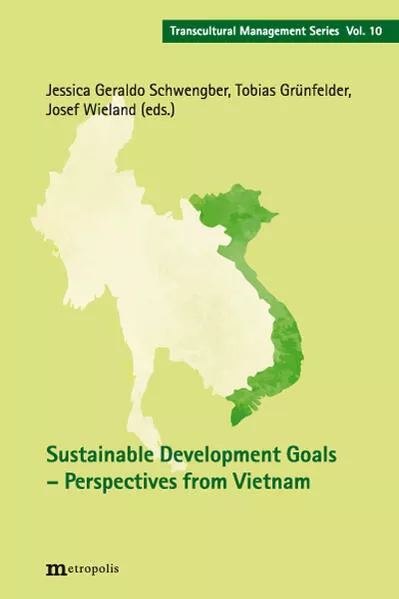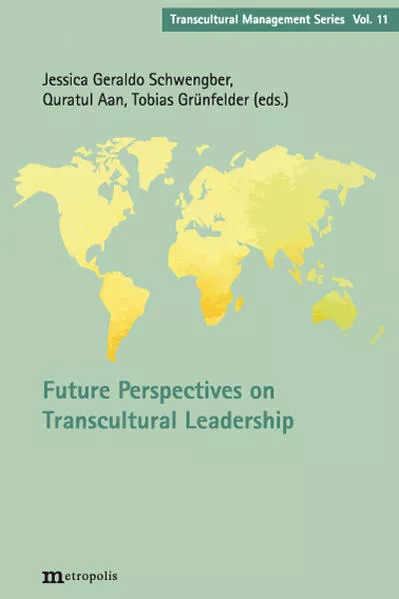Transcultural Management Series
European Perspectives on the New Silk Roads - A Transcultural Approach
Chronologie aller Bände (1 - 3)

Die Reihenfolge beginnt mit dem Buch "European Perspectives on the New Silk Roads - A Transcultural Approach". Wer alle Bücher der Reihe nach lesen möchte, sollte mit diesem Band von Josef Wieland beginnen. Mit insgesamt 3 Bänden wurde die Reihe über einen Zeitraum von ungefähr 2 Jahren fortgesetzt. Der neueste Band trägt den Titel "Future Perspectives on Transcultural Leadership".
- Anzahl der Bewertungen für die gesamte Reihe: 0
- Ø Bewertung der Reihe: 0
- Start der Reihe: 01.10.2022
- Neueste Folge: 01.11.2024
Diese Reihenfolge enthält 2 unterschiedliche Autoren.
- Band: 9
- Autor: Wieland, Josef
- Anzahl Bewertungen: 0
- Ø Bewertung:
- Medium: Buch
- Veröffentlicht: 01.10.2022
- Genre: Politik
European Perspectives on the New Silk Roads - A Transcultural Approach
As an ambitious project, the New Silk Roads create global value chains in a network that connects Europe, Asia, and Africa and that are characterised by maximum diversity in languages, traditions, values, as well as political, social, and economic systems and settings. As one of the most fascinating and risky developments driving the formation of a global society, this initiative not only seeks the economic integration of more than 70 countries, but also involves many political and cultural challenges. Accordingly, it represents a global economic, political, social, and cultural experiment with potentially beneficial, but also potentially disruptive, consequences for all involved.
It is against this backdrop that this book focuses on European perspectives: regarding the geo-political and economic implications of the New Silk Roads for, on the one hand, Europe’s and the EU’s role in the world and, on the other hand, for Europe’s coherence as a political and economic regional network. In this way, this book aims to contribute understanding of what the New Silk Roads means in economic, political and cultural terms for the European countries involved.
Contents
Part I: Perspectives on BRI
Josef Wieland
Transcultural Challenges of the Belt and Road Initiative
Li Ma, Hao Wang
What the Belt and Road Initiative is and is not: A Researcher's Perspective
Jonathan Keir
Historical and Cultural-Philosophical Perspectives on the New Silk Road(s)
Matthias Niedenführ
The Belt and Road Initiative - A Chinesestyle Globalization Based on Chinese Values
Patrycja Pendrakowska
Disenchanting the 17+1 initiative
Pawel Behrendt
Geopolitical Implications of the New Silk Road(s)
Julian Caletti
Trust and Understanding - a Geopolitical Perspective on the Relations between China and Europe
Part II: Research Projects on the Impacts of the BRI on Europe
Patryk Szczotka
Paradiplomacy with Chinese Characteristics. The Relational Governance Model in Sino-European Substate Relations.
Florian Horky, Paulina Kintzinger, Izabela Szczecinska
Dynamics and Developments of Chinese M&A Transactions in the Wake of the BRI
Lorenz Bokari, Karolina Pajączek, Aleksandra Kozerska
Legal Challenges Accompying the Belt and Road Initiative in Poland and Germany with the Focus on International Trade Law
Jessica Britzwein and Aleksandra Balasińska
Civil Society Interaction with the Belt and Road Initiative. The case of Germany and Poland.
Katharina Hahn, Sandra Krawczyszyn
Adding a Gender perspective to the BRI – the Case of Poland and Germany
Tobias Ilg, Natalia Ziółkowska
Public Opinition
Part III
Harald F. Müller, Julika Baumann Montecinos
The Transcultural Leadership Summit as a Platform for Diversity and Cooperation of Disciplines
It is against this backdrop that this book focuses on European perspectives: regarding the geo-political and economic implications of the New Silk Roads for, on the one hand, Europe’s and the EU’s role in the world and, on the other hand, for Europe’s coherence as a political and economic regional network. In this way, this book aims to contribute understanding of what the New Silk Roads means in economic, political and cultural terms for the European countries involved.
Contents
Part I: Perspectives on BRI
Josef Wieland
Transcultural Challenges of the Belt and Road Initiative
Li Ma, Hao Wang
What the Belt and Road Initiative is and is not: A Researcher's Perspective
Jonathan Keir
Historical and Cultural-Philosophical Perspectives on the New Silk Road(s)
Matthias Niedenführ
The Belt and Road Initiative - A Chinesestyle Globalization Based on Chinese Values
Patrycja Pendrakowska
Disenchanting the 17+1 initiative
Pawel Behrendt
Geopolitical Implications of the New Silk Road(s)
Julian Caletti
Trust and Understanding - a Geopolitical Perspective on the Relations between China and Europe
Part II: Research Projects on the Impacts of the BRI on Europe
Patryk Szczotka
Paradiplomacy with Chinese Characteristics. The Relational Governance Model in Sino-European Substate Relations.
Florian Horky, Paulina Kintzinger, Izabela Szczecinska
Dynamics and Developments of Chinese M&A Transactions in the Wake of the BRI
Lorenz Bokari, Karolina Pajączek, Aleksandra Kozerska
Legal Challenges Accompying the Belt and Road Initiative in Poland and Germany with the Focus on International Trade Law
Jessica Britzwein and Aleksandra Balasińska
Civil Society Interaction with the Belt and Road Initiative. The case of Germany and Poland.
Katharina Hahn, Sandra Krawczyszyn
Adding a Gender perspective to the BRI – the Case of Poland and Germany
Tobias Ilg, Natalia Ziółkowska
Public Opinition
Part III
Harald F. Müller, Julika Baumann Montecinos
The Transcultural Leadership Summit as a Platform for Diversity and Cooperation of Disciplines
- Band: 10
- Autor: Geraldo Schwengber, Jessica
- Anzahl Bewertungen: 0
- Ø Bewertung:
- Medium: Buch
- Veröffentlicht: 01.11.2023
- Genre: Politik
Sustainable Development Goals - Perspectives from Vietnam
Southeast Asia, a dynamic and culturally diverse region, is experiencing remarkable economic growth and transformation in the 21st century. Comprising eleven countries and home to over 650 million people, Southeast Asia offers a compelling narrative of adaptability, development, and potential.
As Southeast Asia continues to develop and play a prominent role in the global economy, this book aims for a deeper exploration of the region's challenges, opportunities, and contributions to the United Nations´ Sustainable Development Goals (SDGs).
The book is the result of the Transcultural Student Research Group 2022, a project conducted by the Transcultural Caravan at the Leadership Excellence Institute Zeppelin at Zeppelin University (Germany) in collaboration with HTWG Konstanz (Germany), the University of Lodz (Poland), the Vietnamese German University (Vietnam) and Fulbright University (Vietnam). The whole project involved more than 30 young researchers and it is an exploration of the SDGs with a focus on the application and implications of such goals in Vietnam. The book provides an in-depth look at the challenges and opportunities facing this country and region, as well as the potential for collaboration and sustainable development.
The book delves into specific aspects of Vietnam, including gender, culture, society, environmental issues, and management and governance, providing a comprehensive understanding of the region's vibrant and evolving economy.
Contents
Part I ‒ Overview on Sustainable Development Goals and South-East Asia
Natalia Ratajczyk
The History of Sustainable Development and the Sustainable Development Goals
Jessica G. Schwengber and Lukas Belser
Systematic Literature Review on SDGs: Trends, Disciplines and Geographies
Christian von Lübke
Southeast Asia – Diversity, Decoloniality and Digital Change
Part II ‒ Gender, Culture and Society in Vietnam and their Connection with Sustainable Development
Ngoc Lan Thi Dang
Navigating Traditional Culture of Gender and Institutional Norms: Autoethnography of a Woman Academic’s Career Advancement
Annika Phuong Dinh and Nguyen Thanh Thuy
The Role of the Education System in Promoting Gender (In-) Equality in Vietnam
Dinh Ngoc Thao Pham, Eliza Spocińska and Andrea Brütting
Gender Inequality in Vietnam and Its Driving Factors
Lisa Thien-Kim Tran
Vietnam’s Women in Leadership: Behind Outperforming Female Participation in Leadership-Background, Opportunities, and Challenges
Part III ‒ Environment
Huynh Truong Thi Ngoc, Florian Horky and Chi Le Quoc
Take a Deep Breath! The Role of SDG Fulfilment for Air Pollution in EU and ASEAN Countries
Raven Rudnik and Diana Zervas
The Impact of Road Transportation on Air Quality in Vietnam
Vivien Dinh, Patryk Kurc and Nguyen Hoang Yen
Environmental Issues in the Mekong Delta: An Exploratory Study of Local Awareness, Responsibilities, and Action
Part IV ‒ Management and Governance
Zino Manuel Roos, Lilian Susanne Isabell Evertz and Trần Phương Anh Nguyễn
Public-Private Partnerships for Sustainable Development: A Comparative Case Study in the Vietnamese and German Healthcare Sector
Friederike Schöler, Linh Ngoc-Phuong Nguyen, Nhien Thuy-Phuong Le and Trung Quoc Nguyen
Motivations and Leadership Styles: Preferences of Gen Z in Germany and Vietnam
As Southeast Asia continues to develop and play a prominent role in the global economy, this book aims for a deeper exploration of the region's challenges, opportunities, and contributions to the United Nations´ Sustainable Development Goals (SDGs).
The book is the result of the Transcultural Student Research Group 2022, a project conducted by the Transcultural Caravan at the Leadership Excellence Institute Zeppelin at Zeppelin University (Germany) in collaboration with HTWG Konstanz (Germany), the University of Lodz (Poland), the Vietnamese German University (Vietnam) and Fulbright University (Vietnam). The whole project involved more than 30 young researchers and it is an exploration of the SDGs with a focus on the application and implications of such goals in Vietnam. The book provides an in-depth look at the challenges and opportunities facing this country and region, as well as the potential for collaboration and sustainable development.
The book delves into specific aspects of Vietnam, including gender, culture, society, environmental issues, and management and governance, providing a comprehensive understanding of the region's vibrant and evolving economy.
Contents
Part I ‒ Overview on Sustainable Development Goals and South-East Asia
Natalia Ratajczyk
The History of Sustainable Development and the Sustainable Development Goals
Jessica G. Schwengber and Lukas Belser
Systematic Literature Review on SDGs: Trends, Disciplines and Geographies
Christian von Lübke
Southeast Asia – Diversity, Decoloniality and Digital Change
Part II ‒ Gender, Culture and Society in Vietnam and their Connection with Sustainable Development
Ngoc Lan Thi Dang
Navigating Traditional Culture of Gender and Institutional Norms: Autoethnography of a Woman Academic’s Career Advancement
Annika Phuong Dinh and Nguyen Thanh Thuy
The Role of the Education System in Promoting Gender (In-) Equality in Vietnam
Dinh Ngoc Thao Pham, Eliza Spocińska and Andrea Brütting
Gender Inequality in Vietnam and Its Driving Factors
Lisa Thien-Kim Tran
Vietnam’s Women in Leadership: Behind Outperforming Female Participation in Leadership-Background, Opportunities, and Challenges
Part III ‒ Environment
Huynh Truong Thi Ngoc, Florian Horky and Chi Le Quoc
Take a Deep Breath! The Role of SDG Fulfilment for Air Pollution in EU and ASEAN Countries
Raven Rudnik and Diana Zervas
The Impact of Road Transportation on Air Quality in Vietnam
Vivien Dinh, Patryk Kurc and Nguyen Hoang Yen
Environmental Issues in the Mekong Delta: An Exploratory Study of Local Awareness, Responsibilities, and Action
Part IV ‒ Management and Governance
Zino Manuel Roos, Lilian Susanne Isabell Evertz and Trần Phương Anh Nguyễn
Public-Private Partnerships for Sustainable Development: A Comparative Case Study in the Vietnamese and German Healthcare Sector
Friederike Schöler, Linh Ngoc-Phuong Nguyen, Nhien Thuy-Phuong Le and Trung Quoc Nguyen
Motivations and Leadership Styles: Preferences of Gen Z in Germany and Vietnam
- Band: 11
- Autor: Geraldo Schwengber, Jessica
- Anzahl Bewertungen: 0
- Ø Bewertung:
- Medium: Buch
- Veröffentlicht: 01.11.2024
- Genre: Politik
Future Perspectives on Transcultural Leadership
The future is unpredictable. The increasing complexity of global value creation, climate change, pandemics, wars, conflicts and many other factors radically challenge our way of living, cooperating and leading.
Transcultural leadership – the willingness and ability to develop commonalities (e.g., shared meanings and actions) while maintaining cultural diversity – will be an important factor in addressing these challenges. By developing new connections and commonalities across different cultures, transcultural leadership contributes to successful cooperation and thus
forms the basis for shaping possible futures.
This book is the result of a learning journey of the Transcultural Student Research Group 2023 of the Transcultural Caravan Network (TCN). The TCN is a project of the Baden-Württemberg Stiftung, and it is an alliance of universities from different countries around the world that share the goal of facilitating multilateral research projects for students.
The book examines transcultural leadership from a future, social, political and economic perspective, offering unique insights into transcultural leadership and an outlook on possible futures.
Contents
I – Envisioning potential future(s)
Futures Literacy Laboratory on Leadership in a Global Context – New learning and futuresoriented formats for international education • Creating the Future: Imagineering, Leadership and Literacies – An Interview with Jörg Metelmann
II – Business and economical perspectives
How does psychological safety foster transcultural leadership? A cross-methodical approach to psychological safety and its implications • How Leaders Navigate a Global Strategy with Diverse Local Realities • AI application and limitations in transcultural recruitment
III – Political perspectives
Ridging Germany and Morocco: A pratical approach to the study of transculturalism • Beyond Borders – The Future of Transcultural Diplomacy in the Age of AI and Human Rights
IV – Social Perspectives
Relating different knowledge systems – A mission for transcultural leadership • Sustainable Architecture for Adverse Environmental and Labor Contexts
Transcultural leadership – the willingness and ability to develop commonalities (e.g., shared meanings and actions) while maintaining cultural diversity – will be an important factor in addressing these challenges. By developing new connections and commonalities across different cultures, transcultural leadership contributes to successful cooperation and thus
forms the basis for shaping possible futures.
This book is the result of a learning journey of the Transcultural Student Research Group 2023 of the Transcultural Caravan Network (TCN). The TCN is a project of the Baden-Württemberg Stiftung, and it is an alliance of universities from different countries around the world that share the goal of facilitating multilateral research projects for students.
The book examines transcultural leadership from a future, social, political and economic perspective, offering unique insights into transcultural leadership and an outlook on possible futures.
Contents
I – Envisioning potential future(s)
Futures Literacy Laboratory on Leadership in a Global Context – New learning and futuresoriented formats for international education • Creating the Future: Imagineering, Leadership and Literacies – An Interview with Jörg Metelmann
II – Business and economical perspectives
How does psychological safety foster transcultural leadership? A cross-methodical approach to psychological safety and its implications • How Leaders Navigate a Global Strategy with Diverse Local Realities • AI application and limitations in transcultural recruitment
III – Political perspectives
Ridging Germany and Morocco: A pratical approach to the study of transculturalism • Beyond Borders – The Future of Transcultural Diplomacy in the Age of AI and Human Rights
IV – Social Perspectives
Relating different knowledge systems – A mission for transcultural leadership • Sustainable Architecture for Adverse Environmental and Labor Contexts


